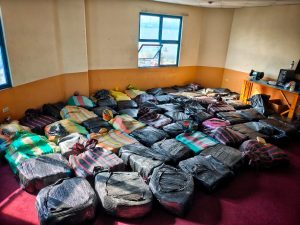
FOR the latter part of 2021, the beaches in Trinidad and Tobago saw an absence of public attendance, recreational activities and general human interaction.
While some environmental activists welcomed the downtime other activities continued.
Activities went unnoticed and ignored by the general population and by extension, the authorities.
There are a series of business-driven and construction-oriented activities that cause such occurrences that are often dismissed as ‘no big deal’.
The reality of such operations is part of a wider scope of the problematic existence of the abuse of our natural environment.
In every country, construction and building are always seen as a form of development.
Whether that development is sustainable or even environmentally friendly, is another story.
The objective of most construction industry practitioners, sub-contract operators, machinery and raw-building material providers is to gain a profit by using any means necessary, inclusive of mining or extracting material from any location possible.
A Pandora’s box is often open when we begin to unpack the economic gains of some construction companies and their subsidiaries. One would think that with all of the financial and monetary gains, a more caring approach would be taken.
There is a lack of education as to what illegal activities to look for and how said activities affects the natural environment, and the next generations.
Citizens ought to know what to look for and it would be in their best interest to report any illegal extractive industries and operations that have developed.
The issue of beachfront or sea-sand mining always crops up as a discussion amongst people who are environmentally minded and even in various localities that occupy coastal regions of any small-island developing state.
This has emerged as a dirty little secret of many building and construction entities.
Even the small machine operators that look for their next dollar by pushing off sharp sand, aggregate, rotten rock and other required materials needed for development are grossly responsible for many activities that contribute to environmental degradation.
One common practice seems to be the mixing of sand derived from beaches with other materials and passed off as sharp sand – a key ingredient in construction operations.
This may seem like an excusable occurrence to a regular man on the street, but it is, in fact, illegal. Added to that the buyer gets a significantly lower standard of building materials, attaining a headache should that material not hold effectively.
Faulty structural framework has become evidence that sea-sand mining for mixing with other materials has become so common placed, that it’s only through failed construction projects, anyone seems to sit up and take notice, which prompts questions only long after the fact.
Tobago, given its unhindered access to the beachfront by heavy machinery and in some cases, small-scale mining activities makes it a bit tricky in clamping down on such practices.
While it is good that many people see the construction industry as a lucrative and pivotal part of the island’s development, nothing should be left to chance and legislation and or environmental consultation for protecting our coastal spaces should be high on the agenda for discussion amongst our lawmakers and officials in public office.
The time is now to find out where the ‘holes’ on several beaches island-wide have come from.
Undoubtedly, it is hard to justify the landing of aliens being responsible for the obvious extraction of sea sand from our shorelines. The said holes on beaches can only be chased up, if our friendly village councils, community-based organisations and the like, are educated and made aware of what to look for.
Additionally, the average citizen must continue to act as watchdogs for the island regardless of affiliation to any organisation or activism group.
The urge is for the next generation to pick up the mantle and let their voices be heard on such issues since in the future, someone just may sell them a product that is sub-standard, and no house built on a foundation that is unstable will stand to the test of time.
Danger can be nowhere near an exciting proposition when lives can be lost and life savings reduced to crumbled debris on the ground.
Sean C. McCoon is the Manager of Environment Tobago. He is also an environmental activist, musician and international relations and communications consultant. The opinions expressed in this column is not necessarily that of AZP News, a Division of Complete Image Limited.
![]()














